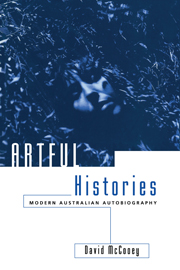Book contents
- Frontmatter
- Contents
- Acknowledgments
- Introduction
- 1 Autobiography and History
- 2 Beginnings: Histories and Families
- 3 Beginnings and Myth
- 4 Parents, Crisis and Education
- 5 The Hidden Past and Personal History
- 6 Autobiographies of Displacement
- 7 The Individual and Place
- 8 Fiction and Autobiography
- Conclusion
- Notes
- Select Bibliography
- Index
2 - Beginnings: Histories and Families
Published online by Cambridge University Press: 05 March 2012
- Frontmatter
- Contents
- Acknowledgments
- Introduction
- 1 Autobiography and History
- 2 Beginnings: Histories and Families
- 3 Beginnings and Myth
- 4 Parents, Crisis and Education
- 5 The Hidden Past and Personal History
- 6 Autobiographies of Displacement
- 7 The Individual and Place
- 8 Fiction and Autobiography
- Conclusion
- Notes
- Select Bibliography
- Index
Summary
For man to tell how human life began
Is hard; for who himself beginning knew?
Autobiographies in general, and autobiographies of childhood in particular, are meditations on beginnings. The phrase ‘to begin again’ illustrates the impossibility of ever beginning absolutely. As observed in the previous chapter, secular history lacks both the teleology and the primum mobile of sacred history. Hence, when Edward Said claims in his work on beginnings that the discourses of Darwin and others did away with beginnings, he means that they did away with an absolute, unambiguous beginning; that is, an origin as distinct from a beginning: ‘In the beginning God created the heavens and the earth’ (Genesis, I, 1), or ‘In the beginning was the Word’ (John, I, 1). Said writes: ‘The state of mind that is concerned with origins is … theological. By contrast, and this is the shift, beginnings are eminently secular, or gentile, continuing activities.’ Beginning then ‘is a consciously intentional, productive activity … whose circumstances include a sense of loss’ (p. 372). Said is primarily concerned with fictive beginnings, but the sense of loss is also fundamental to the nature of autobiographical beginnings.
All beginnings, as Paul Connerton reminds us in How Societies Remember, ‘contain an element of recollection’. The beginning, then, is the first interpretive act of the historian. Whilst beginnings may be difficult (philosophically and historiographically), autobiographers share an intent and a rhetoric which allows autobiography to begin recognizably as autobiography.
- Type
- Chapter
- Information
- Artful HistoriesModern Australian Autobiography, pp. 26 - 47Publisher: Cambridge University PressPrint publication year: 1996



